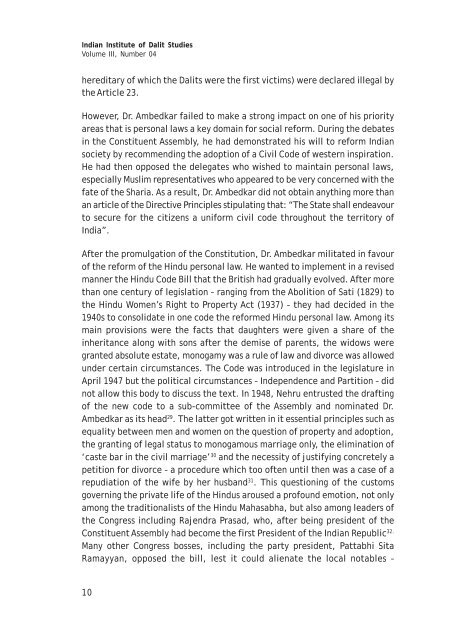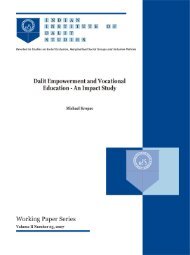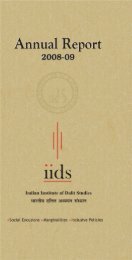Dr. Ambedkar's Strategies Against Untouchability and the Caste
Dr. Ambedkar's Strategies Against Untouchability and the Caste
Dr. Ambedkar's Strategies Against Untouchability and the Caste
You also want an ePaper? Increase the reach of your titles
YUMPU automatically turns print PDFs into web optimized ePapers that Google loves.
Indian Institute of Dalit Studies<br />
Volume III, Number 04<br />
hereditary of which <strong>the</strong> Dalits were <strong>the</strong> first victims) were declared illegal by<br />
<strong>the</strong> Article 23.<br />
However, <strong>Dr</strong>. Ambedkar failed to make a strong impact on one of his priority<br />
areas that is personal laws a key domain for social reform. During <strong>the</strong> debates<br />
in <strong>the</strong> Constituent Assembly, he had demonstrated his will to reform Indian<br />
society by recommending <strong>the</strong> adoption of a Civil Code of western inspiration.<br />
He had <strong>the</strong>n opposed <strong>the</strong> delegates who wished to maintain personal laws,<br />
especially Muslim representatives who appeared to be very concerned with <strong>the</strong><br />
fate of <strong>the</strong> Sharia. As a result, <strong>Dr</strong>. Ambedkar did not obtain anything more than<br />
an article of <strong>the</strong> Directive Principles stipulating that: “The State shall endeavour<br />
to secure for <strong>the</strong> citizens a uniform civil code throughout <strong>the</strong> territory of<br />
India”.<br />
After <strong>the</strong> promulgation of <strong>the</strong> Constitution, <strong>Dr</strong>. Ambedkar militated in favour<br />
of <strong>the</strong> reform of <strong>the</strong> Hindu personal law. He wanted to implement in a revised<br />
manner <strong>the</strong> Hindu Code Bill that <strong>the</strong> British had gradually evolved. After more<br />
than one century of legislation – ranging from <strong>the</strong> Abolition of Sati (1829) to<br />
<strong>the</strong> Hindu Women’s Right to Property Act (1937) – <strong>the</strong>y had decided in <strong>the</strong><br />
1940s to consolidate in one code <strong>the</strong> reformed Hindu personal law. Among its<br />
main provisions were <strong>the</strong> facts that daughters were given a share of <strong>the</strong><br />
inheritance along with sons after <strong>the</strong> demise of parents, <strong>the</strong> widows were<br />
granted absolute estate, monogamy was a rule of law <strong>and</strong> divorce was allowed<br />
under certain circumstances. The Code was introduced in <strong>the</strong> legislature in<br />
April 1947 but <strong>the</strong> political circumstances – Independence <strong>and</strong> Partition – did<br />
not allow this body to discuss <strong>the</strong> text. In 1948, Nehru entrusted <strong>the</strong> drafting<br />
of <strong>the</strong> new code to a sub-committee of <strong>the</strong> Assembly <strong>and</strong> nominated <strong>Dr</strong>.<br />
Ambedkar as its head 29 . The latter got written in it essential principles such as<br />
equality between men <strong>and</strong> women on <strong>the</strong> question of property <strong>and</strong> adoption,<br />
<strong>the</strong> granting of legal status to monogamous marriage only, <strong>the</strong> elimination of<br />
‘caste bar in <strong>the</strong> civil marriage’ 30 <strong>and</strong> <strong>the</strong> necessity of justifying concretely a<br />
petition for divorce – a procedure which too often until <strong>the</strong>n was a case of a<br />
repudiation of <strong>the</strong> wife by her husb<strong>and</strong> 31 . This questioning of <strong>the</strong> customs<br />
governing <strong>the</strong> private life of <strong>the</strong> Hindus aroused a profound emotion, not only<br />
among <strong>the</strong> traditionalists of <strong>the</strong> Hindu Mahasabha, but also among leaders of<br />
<strong>the</strong> Congress including Rajendra Prasad, who, after being president of <strong>the</strong><br />
Constituent Assembly had become <strong>the</strong> first President of <strong>the</strong> Indian Republic 32.<br />
Many o<strong>the</strong>r Congress bosses, including <strong>the</strong> party president, Pattabhi Sita<br />
Ramayyan, opposed <strong>the</strong> bill, lest it could alienate <strong>the</strong> local notables –<br />
10





